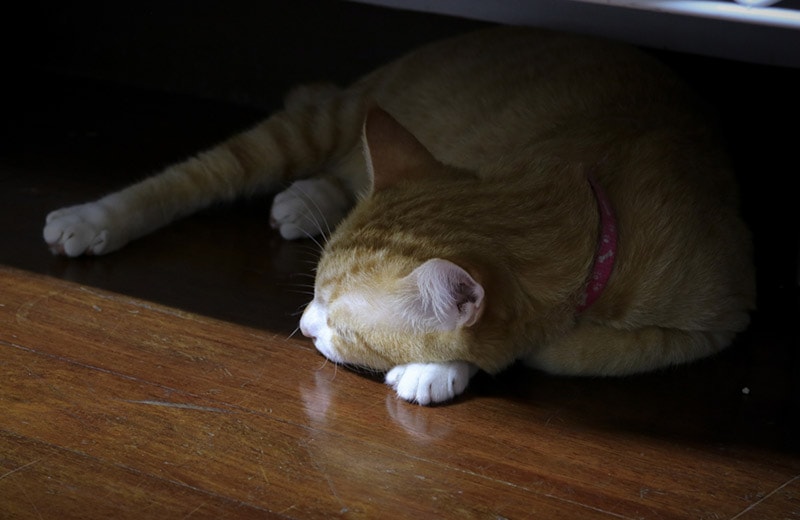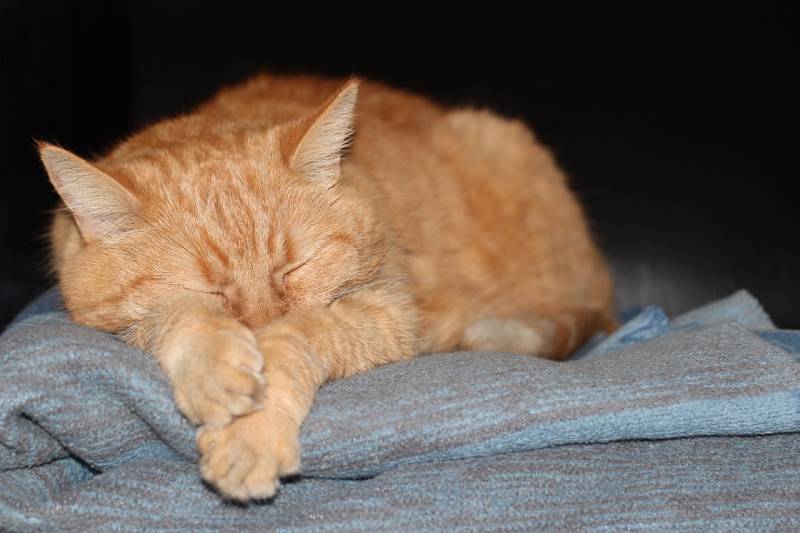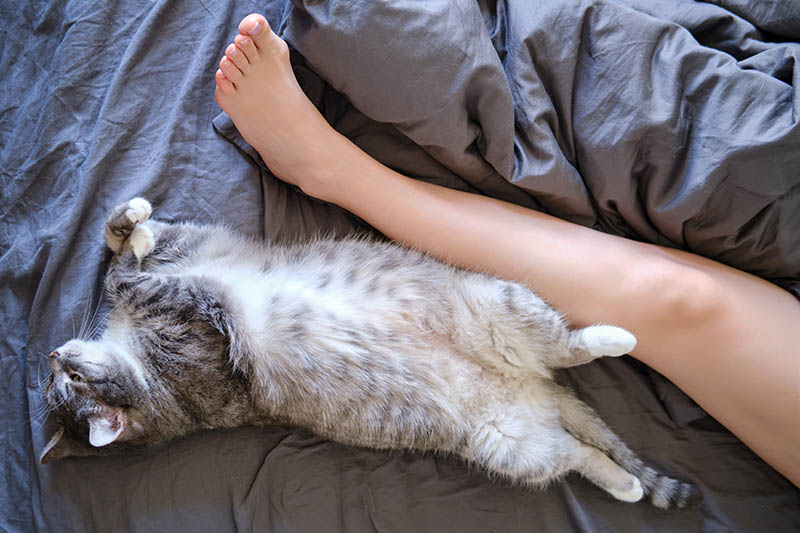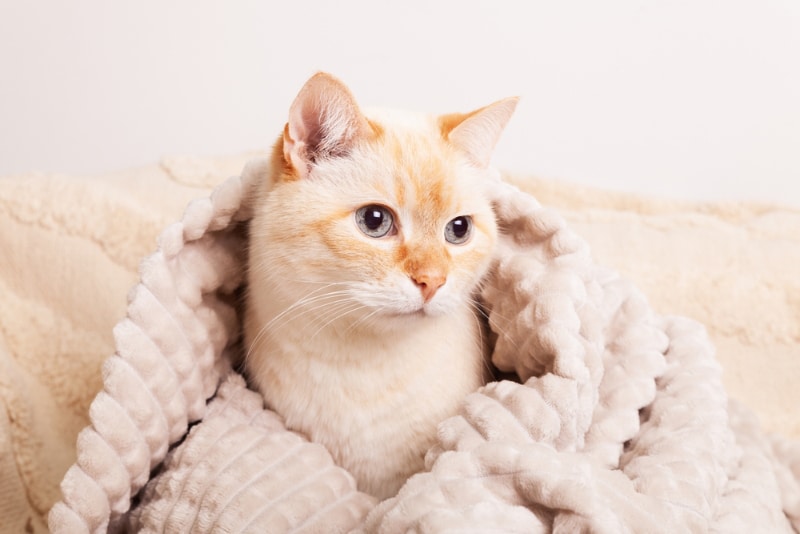Cats have long captured the imagination of humans with their unique behavior and wild nature. From their graceful agility to their quirky expressions, beloved feline companions have fascinated owners and pet lovers for centuries.
However, one strange aspect that continues to arouse curiosity is whether these seemingly distant creatures hibernate during the cold winter months. Actually, as cats experience changes in colder weather, they don’t hibernate.
In explaining this answer, we look at their evolutionary history and understand their instinctual behavior!


Hibernation explained
Hibernation is a biological phenomenon exhibited by certain animals, usually in response to adverse environmental conditions such as extreme cold or lack of food. During hibernation, these animals enter a state of dormancy, which significantly reduces their metabolic rate, body temperature, and activity levels.
This energy-conserving strategy allows them to endure harsh conditions, conserve their limited resources, and survive in times of hardship. Although hibernation varies among species, the basic principle remains the same: a temporary, energy-saving “sleep” that helps animals get through the worst of times and appear relatively unscathed when things improve. condition.


Common Sleeping Habits of Cats
Although cats do not hibernate, they are known for their unusual sleeping habits. On average, a healthy adult cat spends about 12 to 16 hours a day sleeping, with some cats reaching an astounding 20 hours of sleep.
These feline siestas are usually distributed throughout the day and night, with cats being crepuscular, meaning they are most active at dawn and dusk.
Cats are also light sleepers, with the ability to be quickly aroused, stemming from their ancestral hunting instincts. This allows them to be alert to potential threats or opportunities for hunting even when they are resting. Although the specifics of a cat’s sleep pattern can vary based on age, health, and individual temperament, their sleep habits remain a fascinating and important aspect of their nature.

Why Do Cats Sleep So Much?
Cats sleep a lot because of their evolutionary heritage as skilled predators. This extensive sleep not only conserves energy but also supports their unique hunting behavior. Cats are crepuscular hunters, and their prey is usually most active at dawn and dusk.
By resting for a significant part of the day, cats can be well rested and fully alert during prime hunting hours. Additionally, deep sleep plays an important role in muscle and tissue repair, ensuring that a cat’s body is in good condition for bursts of intense activity during their hunting pursuits. .
Abundant sleep also helps cats process and store information from their environment and experiences, which contributes to their adaptability and survival skills.


How Does Colder Weather Affect Cats?
Colder weather can significantly affect cats in a number of ways. One of the most noticeable effects is their natural tendency to seek warmth and shelter to stay comfortable. Cats may have a preference for cozy spaces, sunlight, or snuggling to keep warm.
Their physical activity levels may also decrease as cold weather may inhibit outdoor exploration and play. Additionally, the dry air in the colder months can lead to skin and fur issues for some cats, requiring extra grooming and care.
Some cats may also experience seasonal fluctuations in appetite, while others may gain weight more easily due to reduced activity. In general, cats tend to adapt to the cold by conserving energy, seeking warmth, and adjusting their behaviors to stay comfortable and safe in colder weather.

Sleeping Habits of Cats in Winter
During the winter, cats often adapt their sleeping habits to cooler and darker conditions. As with other seasons, cats will still sleep for a large part of the day.
However, lower temperatures and less daylight may lead them to seek warmer and more comfortable places to sleep. You may notice your cat favoring the sunny side of the sun or curling up in blankets, cozy corners, or even with their human companions to stay warm.
Cats may also sleep longer during the winter, as the extended darkness may trigger their natural instincts for conserving energy. This increased sleep will help them stay warm and reduce the need for frequent movement, especially if their outdoor activities are reduced due to cold weather. So, while their general sleeping patterns may remain consistent, you will likely notice a preference for warmer and more sheltered areas during the winter months.
Cats in the Wild
In the wild, the sleeping habits of cats, like lions and tigers, are intricately related to their roles as apex predators. These large felids are typically nocturnal hunters, with their hunting activities peaking at night. Like their domestic counterparts, they also do not hibernate.
Consequently, their daytime sleep patterns involve long, deep slumbers to conserve energy after the great effort of hunting and consuming prey.
In the wild, cats often seek secluded and hidden places where they can rest undisturbed and protect themselves from potential threats. These behaviors are essential for maintaining their physical and mental readiness for hunting, as well as ensuring their survival in the challenging and competitive environment of the wild.


Tips for Taking Care of Cats in Colder Weather
During the colder weather, it’s important to provide extra care for your cat to ensure their comfort and well-being.
First and foremost, create a warm and cozy environment inside your home by offering soft bedding, blankets, or a heated cat bed for your feline friend to cuddle up to. Make sure they have access to sunny spots, as cats love to bask in the sun for warmth.
Keep your cat’s living space draft-free and protected from the cold. You may also consider adjusting their diet to accommodate potential changes in activity levels during the winter. Make sure your cat has access to fresh water, as indoor heating can dry out the air, and they may need more hydration.
Regular grooming can help maintain the insulating properties of their coat and prevent skin issues caused by dry indoor air.
Finally, if your cat goes outside, monitor their time outside, as extreme cold can be dangerous, and provide warm, safe shelter. These steps will help keep your cat safe, comfortable, and healthy during the colder months.


Final Thoughts
Although cats don’t hibernate, it’s important to understand your cat’s behaviors, whether it’s their tendency to sleep, adaptation to colder weather, or need for warmth and comfort.
The unique characteristics and instincts of cats make them remarkably adaptable creatures, capable of thriving in a variety of environments. By adapting to their needs and providing a caring and nurturing home, we can ensure our feline companions live happy and healthy lives all year round, regardless of the challenges that the changing seasons bring!
Featured Image Credit: CPM PHOTO, Shutterstock


